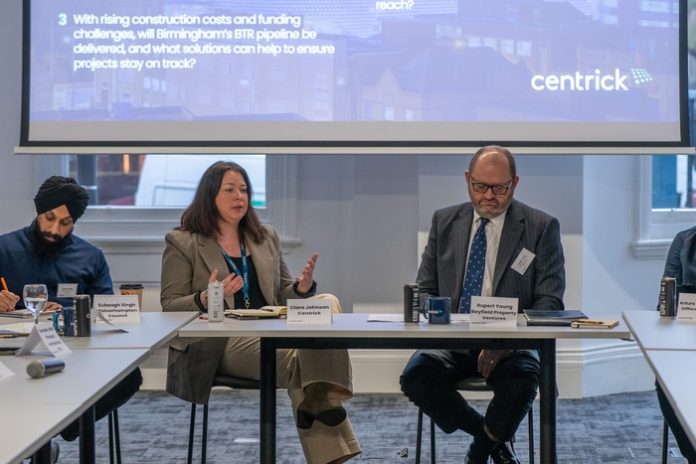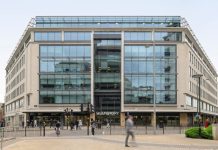
With £4.2 billion in deals projected this year, Birmingham’s build to rent (BTR) sector is poised for transformation, according to a group of leading property experts.
A high-profile roundtable hosted by property specialist Centrick brought together experts to explore how the city can capitalise on its growing BTR sector while ensuring long-term sustainability, affordability, and community-driven development.
The event, held at Centrick’s state-of-the-art training facility in Newhall Street, was moderated by Rupert Young, director of Bayfield Property Ventures, and featured a panel including Centrick’s founder Carina Ackrill, build to rent and asset director Clare Johnson and group business director Jane Morcom.
They were joined by key industry figures from FRA Wayfinding, The Construction Consultants, Cundall, Rund, Pinnacle Architecture, SEC Newgate, WSP, and Naismiths.
Rupert Young highlighted Birmingham’s impressive growth trajectory, noting a projected pipeline of almost 20,000 BTR units. However, he cautioned that strategic, phased development was essential to prevent market oversaturation while maintaining quality for residents.
Clare Johnson emphasised the growing demand for “best-value, premium” living spaces, where renters prioritise energy efficiency, sustainability, and high-quality amenities.
“It’s not just about monthly rent – it’s about delivering value through smart, sustainable design and fostering strong communities,” she said.
A major takeaway from the discussion was the role of innovation and collaboration in ensuring BTR success.
- Value Engineering: Sandeep Sunner, from The Construction Consultants, stressed the importance of working closely with contractors to source cost-effective materials while maintaining high design standards.
- Brand Positioning: Wesley Meyer, of FRA Wayfinding, highlighted the need for developers to differentiate their BTR offerings. “Success in this market hinges on brand positioning — how you communicate value to your target audience,” he said.
- Sustainability and Adaptability: Belinda Morgan, of Cundall, explored how modular construction and early stakeholder collaboration can optimise cost-efficiency and long-term sustainability.
Despite industry challenges, such as rising construction costs and funding hurdles, the sentiment at the roundtable was overwhelmingly positive. Attendees agreed that Birmingham is primed to lead the way in redefining urban living, provided developers remain focused on innovation, affordability, and resident experience.
“The BTR market in Birmingham is still maturing, but we have the tools, talent, and momentum to make it thrive,” said Clare Johnson. “By focusing on sustainability, best-value living, and community-building, we can ensure BTR delivers not just homes, but vibrant living spaces that meet the needs of all.”
Key Takeaways:
- Collaboration is essential to overcoming planning and viability challenges.
- Premium design doesn’t have to be expensive – flexibility, sustainability, and energy efficiency are key.
- Birmingham’s BTR pipeline is strong, but diversification is necessary to avoid market saturation.
- Placemaking with community-focused developments and built-in adaptability will define the future of BTR




















